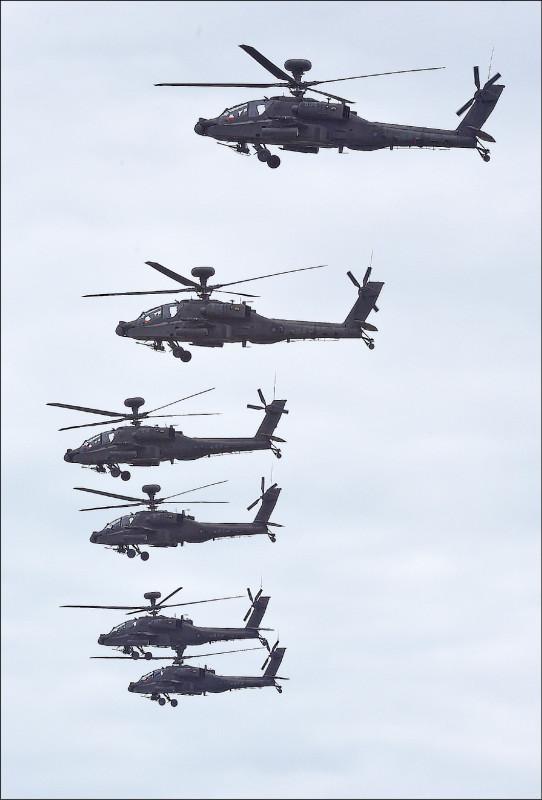An army officer and a suspected spy have been remanded into custody over suspicion of handing military secrets to China.
The High Prosecutors’ Office on Monday directed the Taoyuan unit of the Ministry of Justice Investigation Bureau to search the army’s 601st Aviation Brigade and question suspects.
A lieutenant colonel surnamed Hsieh (謝) is suspected of leaking national defense secrets to Chinese or other foreign agents, as well as developing a spy organization of current and retired military personnel in Taiwan, the office said.

Photo: Taipei Times
Prosecutors believe that Hsieh passed the information to an intermediary appointed by Beijing, also surnamed Hsieh (謝).
After finding evidence pointing to contraventions of laws against treason under the Criminal Code, prosecutors successfully petitioned the Taiwan High Court to detain the two men.
A retired army major and another three people have also been questioned in the case and were released on bail of between NT$20,000 and NT$600,000.
Lawyer and former prosecutor Weng Wei-lun (翁偉倫) said that past espionage cases have primarily involved retired military personnel who were recruited abroad and accepted gifts in exchange for information.
However, Beijing is increasingly “reaching into Taiwan,” targeting active military officers through ever-evolving tactics, he said.
Former prosecutor Chen Tsung-yuan (陳宗元) agreed that the situation is a departure from typical espionage cases.
The High Prosecutors’ Office is investigating the case rather than a lower office, which is significant as it handles crimes of sedition and treason rather than contraventions of national security law, he said.
The fact that the two suspects have been detained also points to more sophisticated tactics by their handlers, Chen added.

Taiwan has received more than US$70 million in royalties as of the end of last year from developing the F-16V jet as countries worldwide purchase or upgrade to this popular model, government and military officials said on Saturday. Taiwan funded the development of the F-16V jet and ended up the sole investor as other countries withdrew from the program. Now the F-16V is increasingly popular and countries must pay Taiwan a percentage in royalties when they purchase new F-16V aircraft or upgrade older F-16 models. The next five years are expected to be the peak for these royalties, with Taiwan potentially earning

STAY IN YOUR LANE: As the US and Israel attack Iran, the ministry has warned China not to overstep by including Taiwanese citizens in its evacuation orders The Ministry of Foreign Affairs (MOFA) yesterday rebuked a statement by China’s embassy in Israel that it would evacuate Taiwanese holders of Chinese travel documents from Israel amid the latter’s escalating conflict with Iran. Tensions have risen across the Middle East in the wake of US and Israeli airstrikes on Iran beginning Saturday. China subsequently issued an evacuation notice for its citizens. In a news release, the Chinese embassy in Israel said holders of “Taiwan compatriot permits (台胞證)” issued to Taiwanese nationals by Chinese authorities for travel to China — could register for evacuation to Egypt. In Taipei, the ministry yesterday said Taiwan

Taiwan is awaiting official notification from the US regarding the status of the Agreement on Reciprocal Trade (ART) after the US Supreme Court ruled US President Donald Trump's global tariffs unconstitutional. Speaking to reporters before a legislative hearing today, Premier Cho Jung-tai (卓榮泰) said that Taiwan's negotiation team remains focused on ensuring that the bilateral trade deal remains intact despite the legal challenge to Trump's tariff policy. "The US has pledged to notify its trade partners once the subsequent administrative and legal processes are finalized, and that certainly includes Taiwan," Cho said when asked about opposition parties’ doubts that the ART was

If China chose to invade Taiwan tomorrow, it would only have to sever three undersea fiber-optic cable clusters to cause a data blackout, Jason Hsu (許毓仁), a senior fellow at the Hudson Institute and former Chinese Nationalist Party (KMT) legislator, told a US security panel yesterday. In a Taiwan contingency, cable disruption would be one of the earliest preinvasion actions and the signal that escalation had begun, he said, adding that Taiwan’s current cable repair capabilities are insufficient. The US-China Economic and Security Review Commission (USCC) yesterday held a hearing on US-China Competition Under the Sea, with Hsu speaking on